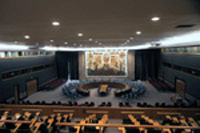
and human security
WCC United Nations liaison office Background |
|
||
|
The peaceful prevention of conflict stems from the principle that preventing the outbreak of war and deadly conflict is more humane, less costly, and more effective than responding after violence has already erupted. In this context, a new understanding of the dynamics and root causes of conflict, as well as a concerted commitment to long-term, structural violence prevention, is called for. New methods and opportunities are needed to remove the obstacles to progress on prevention and engage decision-makers cooperatively in the search for non-violent alternatives to war. The ecumenical movement has a long record of dedication to prevent, or if that is impossible, to peacefully resolve, armed conflicts and wars by means of helping individuals, families, churches, societies and the international community to manage conflicts, and become more skilled in transforming them through non-violent action. WCC actions to date The shaping of the Programme to Overcome Violence also led to the proclamation of an ecumenical Decade to Overcome Violence: Churches Seeking Reconciliation and Peace (2001-2010). Further, as an initiative of the WCC under an ecumenical campaign "End the Illegal Occupation of Palestine: Support a Just Peace in the Middle East", the Ecumenical Accompaniment Programme in Palestine and Israel (EAPPI) was established in 2002. Its mission is to accompany Palestinians and Israelis in their non-violent actions, to monitor and report violations of human rights and international humanitarian law, as well as to carry out concerted advocacy efforts to end the occupation. In relation to the war on Iraq, the WCC, supported by its member churches, took a firm stance against the war and have produced several public statements, as well as a declaration directed at the members of the Security Council, opposing military action against Iraq. WCC UN Liaison Office aims:
Work methods
Network |
|||








